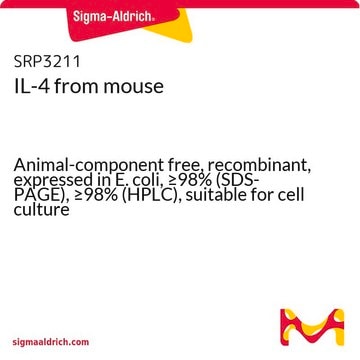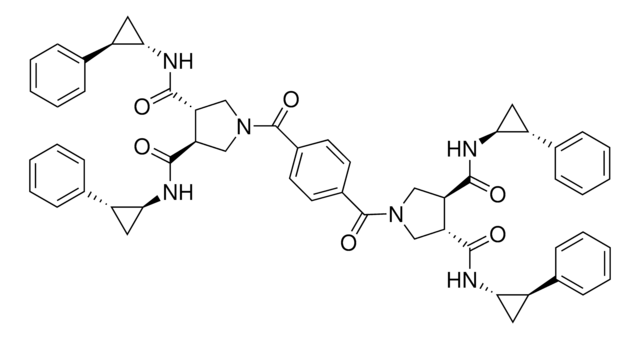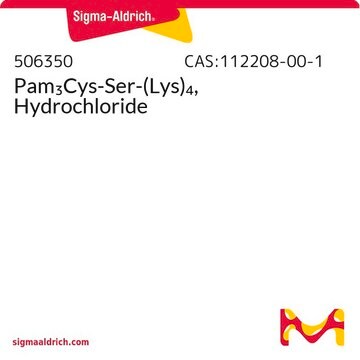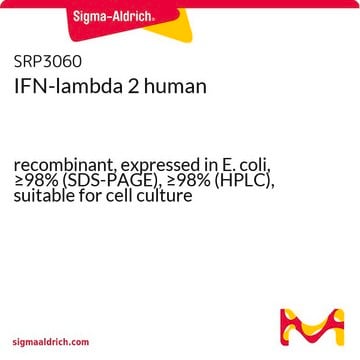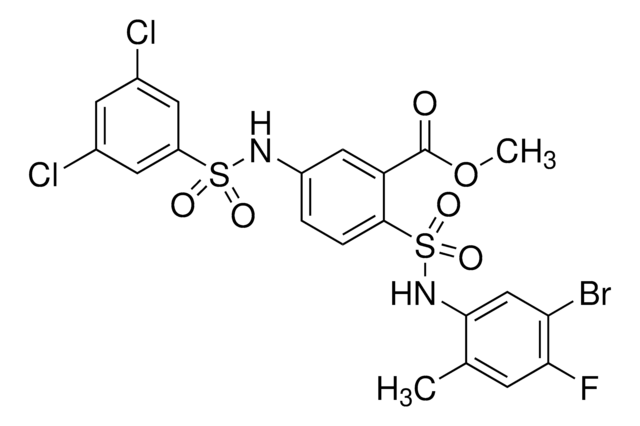SRP3273
IFN-LAMBDA1 human
Animal-component free, recombinant, expressed in E. coli, ≥98% (SDS-PAGE), ≥98% (HPLC)
Synonym(s):
IL-29
Sign Into View Organizational & Contract Pricing
All Photos(1)
About This Item
UNSPSC Code:
12352202
NACRES:
NA.32
Recommended Products
biological source
human
recombinant
expressed in E. coli
Assay
≥98% (HPLC)
≥98% (SDS-PAGE)
form
lyophilized
potency
0.2-0.5 ng/mL
mol wt
19.8 kDa
packaging
pkg of 20 μg
impurities
<0.1 EU/μg endotoxin, tested
color
white to off-white
UniProt accession no.
shipped in
wet ice
storage temp.
−20°C
Gene Information
human ... IL29(282618)
General description
All three IFN-lambdas uses a distinct receptor system composed of an IFN-λR1 subunit (also called CRF2-12) and IL-10R2 subunit (also called CRF2-14). Signaling through this receptor system induces antiviral defense similar but distinct than the type I Interferons.
Biochem/physiol Actions
IFN λ-1,-2, and -3 (also known as IL-29, IL-28A and IL-28B respectively) are distantly related to the IL-10 family and Interferons. Recombinant human IFN-λ1 is a 19.8 kDa protein containing 178 amino acid residues.
Physical form
Lyophilized from 10mM Sodium Phosphate, pH 7.5.
Reconstitution
Centrifuge the vial prior to opening. Reconstitute in water to a concentration of 0.1-1.0 mg/mL. Do not vortex. This solution can be stored at 2-8°C for up to 1 week. For extended storage, it is recommended to further dilute in a buffer containing a carrier protein (example 0.1% BSA) and store in working aliquots at -20°C to -80°C.
Storage Class Code
10 - Combustible liquids
WGK
WGK 3
Flash Point(F)
Not applicable
Flash Point(C)
Not applicable
Certificates of Analysis (COA)
Search for Certificates of Analysis (COA) by entering the products Lot/Batch Number. Lot and Batch Numbers can be found on a product’s label following the words ‘Lot’ or ‘Batch’.
Already Own This Product?
Find documentation for the products that you have recently purchased in the Document Library.
Vivienne A Ezzat et al.
Diabetes, obesity & metabolism, 10(3), 198-211 (2008-02-14)
Patients with insulin resistance and type 2 diabetes have an excessive risk of cardiovascular disease (CVD); this increased risk is not fully explained by traditional risk factors such as hypertension and dyslipidaemias. There is now compelling evidence to suggest that
Expression of human immune interferon cDNA in E. coli and monkey cells.
Gray, P.W. et al.
Nature, 503-508 (1982)
Our team of scientists has experience in all areas of research including Life Science, Material Science, Chemical Synthesis, Chromatography, Analytical and many others.
Contact Technical Service
